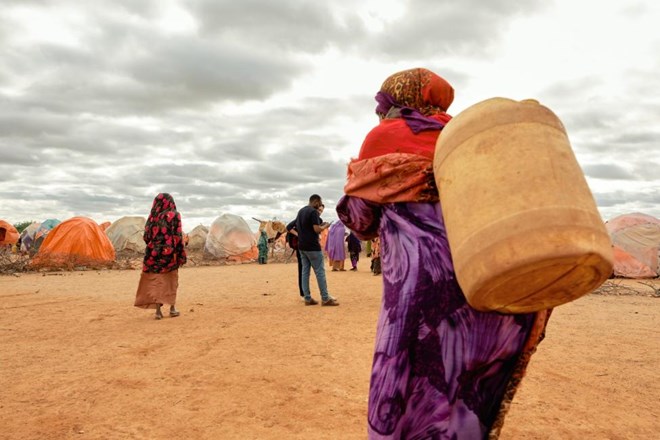Baledweyne (KAAB TV)– Somalia is now dealing with significant environmental and conflict issues. More than a million people were displaced as a result of a catastrophic drought in 2023, significant flooding in 2024, and intensifying conflict with the insurgent group Al-Shabaab.
Samira is battling to care for her newborn daughter, born during drought and conflict, in a camp on the outskirts of Beledweyne, the capital of Hiran district. The struggle between the government and Al-Shabaab worsened, and Samira and many others went hungry and homeless. They currently live in a rudimentary wooden and plastic structure constructed by Samira’s husband and the couple’s other children.
The region is facing the worst drought in 60 years, which is known for the drought and hunger thatThe years 2011-2012 were terrible, and 250,000 people died. Although international aid prevented this year’s famine, the situation remains grim. The majority of the country is experiencing acute food shortages, with hunger threatening rural populations and displaced people.
Somalia is currently struggling with severe environmental and conflict challenges. A historic drought in 2023, widespread flooding in 2024, and the escalating war with the armed group Al-Shabaab caused the displacement of more than a million people.
In a camp on the outskirts of Beledweyne, the capital of Hiran region, Samira is struggling to take care of her new born daughter, who was born during drought and conflict. The conflict between the government and Al-Shabaab intensified, and Samira and many others lost food and shelter. They now live in a basic building made of wood and plastic built by Samira’s husband and the couple’s other children.
The region is facing the worst drought in 60 years, which is remembered for the drought and famine that devastated the years 2011-2012, which claimed the lives of 250,000 people. Although this year’s famine was averted with international aid, the situation is dire. Most of the country is facing severe food shortages, with famine threatening the rural population and the displaced.
Ifraah, another Lower Shabelle resident, discussed the recent severe drought, adding that it has resolved earlier issues. “In 2011, there was help, our cows were saved, but now everything is lost,” she stated. Lack of water has also aggravated animal diseases, which are critical to community survival and economic stability.
Ifrah, who was recently widowed, emphasised the community’s desperate need for quick assistance. “We lack the resources to construct proper shelters or offer essential amenities. We are eager to work and improve our circumstances, but we require assistance, she explained desperate financial necessity..
Islamic Relief is engaged in Somalia and other drought-affected areas in the Horn of Africa, giving crucial supplies such as food, water, and cash. and medical treatment. So far, we’ve helped over tens of thousands of people in these areas. However, expanding existing relief operations poses an economic barrier and is insufficient, as the topic receives little attention.
Islamic Relief calls for a large increase in humanitarian help to preserve lives. Furthermore, there is an urgent need for the international community to support local people in managing the ongoing impact of drought on their economic activities and lifestyles, as well as to enhance their resilience to the ongoing difficulties of approaching climate change.


